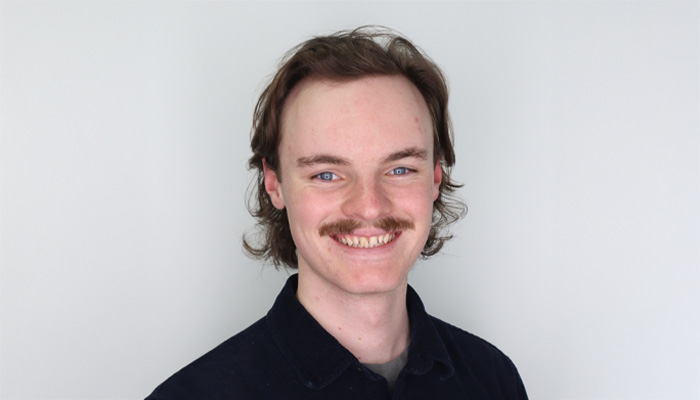Global Undergraduate Awards Spotlight: David Johnson
The Global Undergraduate Awards recently announced the winning submissions for 2025, which include the following from Western: one Global Winner, three Regional Winners and 13 Highly Commended.

David Johnson
Regional Winner: Mathematics & Physics
Fifth-year student in the Faculty of Science (Honours Specialization in Applied Mathematics)
Paper title: Circular Orchard Planting and the 9-point Path Synthesis Problem
Please provide a brief summary of your paper/research.
My research investigates a classic problem in mechanical engineering known as Alt's problem, or the nine-point path synthesis problem. This involves designing simple machines called four-bar linkages – mechanisms capable of tracing a path through a given set of points.
The challenge is: given nine points, how many distinct four-bar linkages can trace a curve through all of them? While the accepted numerical result is 1,442 possible linkages, this figure hasn't yet been rigorously proven. My work explores combinatorial approaches to this problem, focusing on special cases where the nine points lie on circles, and developing computational methods to construct potential configurations.
Although we didn't prove the full theorem, we proposed a conjecture for a smaller, special case, which is an important step toward a complete mathematical proof.
What led to your interest in this area?
I actually started in Integrated Science, then switched to Physics, and eventually to Applied Mathematics with Computer Science before focusing solely on Applied Math.
Physics started feeling less satisfying for me, and I found myself more drawn to the precision and logic of math. In mathematics, there's no uncertainty; things are either true or false, and that clarity really appeals to me. Applied Math gives me the rigor of pure math while also letting me use computers to explore and solve complex problems computationally.
What prompted you to submit your paper to the competition?
I got an email suggesting that I submit my paper, and I decided to go for it because I've been trying to push myself to put my work out there more. It's a bit intimidating, but I think that's an important part of being a good student – and, honestly, of being an adult. You have to take those chances that feel a bit scary.
Can you describe how you felt when you found out you'd been selected as a winner?
I was ecstatic! I really wasn't expecting it. It felt amazing to know that something I wrote resonated with others. It was very validating, and it made me feel like the work I'd done mattered.
What are your plans for the future – do you plan to continue in this field?
Yes, absolutely. I'm starting my master's in Applied Mathematics in January. My focus will be on computational algebraic geometry, a field that combines rigorous mathematical logic with modern computing.
It's fascinating because it has applications in so many areas, such as mechanical systems, chemical reaction networks, and biological modeling. The methods we used in this research could actually be applied across disciplines. Long-term, I'd love to continue doing research in this area, perhaps even as a professor one day.
Will you be attending the Global Summit in Dublin? If so, what are you most looking forward to there?
I'm strongly considering it! It lines up with Reading Week, so I might go then and stay for the summit. I don't want to regret not going. It seems like an incredible opportunity to connect with other students and researchers from around the world.
What do you think the benefit of programs like the Undergraduate Awards is for students?
I think there are two big benefits. First, just preparing and submitting your work is valuable – it gives you experience sharing your research with a wider audience and getting comfortable with your work being read and evaluated.
Second, if you're recognized, it's a huge honor and something meaningful to include on your CV. Being a Global Undergraduate Award Winner sounds impressive, but more than that, it's an affirmation of your effort and ideas.
Is there anything else you'd like to share?
I want to thank the people who supported me throughout this project: my friends and family, who endured countless conversations about math they probably didn't expect to have, and my professors, especially Professor Matthias Franz and Professor Taylor Brysiewicz, for their encouragement and feedback.
And yes, I do talk about applied math with my friends and family whenever I can, usually when we're stuck in a car and they can't escape!

